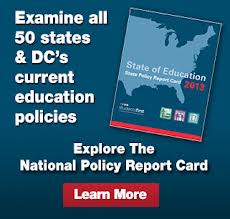I am grateful to Rebecca Sibilia and Sean Gill for their thoughtful response to my blog post encouraging Michelle Rhee to replace her failing schools model of school choice with an approach based on equal opportunity.
Rebecca and Sean defended StudentsFirst’s support of the failing schools model on pragmatic grounds. They wrote: “When state resources are limited or the existing supply of desirable private schools is limited, it also makes sense to prioritize vouchers or scholarships for those low-income children attending a low-performing school or living in low-performing school districts.”
Every community suffers from an insufficient supply of effective schools for low-income students. But in Florida we’ve learned that increasing demand - not limiting demand - is the best way to increase supply.
Access to Florida’s tax credit scholarship program for low-income students, which I help administer, is limited by a state-imposed cap. But our demand is not limited, so it often exceeds supply. This excess demand has not had a negative effect on students or the program. Instead, it has generated political pressure on the state Legislature to allow our cap to rise to meet this additional demand.
In 2010, as a result of excessive demand, the Florida Legislature voted to allow our program to grow 25 percent every year the demand hits or exceeds 90 percent of supply. The result has been extraordinary growth of supply and demand. While we have been awarding scholarships since 2002, 34 percent of our growth has occurred in just the last two years. This school year we added 10,000 more students to the program and had more than 12,000 students add their names to our waiting list after we hit our cap.
We’ve also been adding about 100 new private schools per year to the program, and some have started to expand their physical capacity to serve more students. Had we adopted the StudentsFirst approach of limiting demand when faced with limited supply, this extraordinary growth would not have occurred.
Today, more than 43 percent of Florida’s preK-12 students attend a school other than their assigned district school. Charter schools, magnet schools, virtual schools, career academies, dual enrollment and homeschooling are all growing dramatically. Private schools are already struggling to maintain their market share given all these choices. If we were to limit our scholarships to low-income students in state-designated failing schools, then many private schools serving low-income students might be forced to close - to everyone’s detriment. (more…)

Rhee’s failing schools model for vouchers and tax credit scholarships misinterprets the relationship between students and schools. With rare exceptions, schools are not good or bad independent of the students they serve. Some schools are good for some students and bad for others. A state-designated “A” school can be a terrible match for a particular student, which means for that student the school is a failure.
In recent weeks, Tony Bennett, Florida’s new education commissioner, and Michelle Rhee, the CEO of StudentsFirst, offered conflicting rationales for supporting school choice. Bennett told participants at a National School Choice Week event in Tampa, Fla., that school choice is a necessary condition for equal opportunity and social justice. Low-income children should have access to the same options as the affluent, Bennett said, and this is why he supports providing low-income families with publicly-funded vouchers and scholarships to attend private schools.
StudentsFirst, on the other hand, released a state policy report card that docked Florida a few points for extending school choice to all low-income children. The group favors policies that restrict vouchers and tax credit scholarships to low-income students in state-designated “failing” schools. Within the choice movement, Rhee’s position is called the failing schools model.
Ten years ago, the failing schools model was the most favored, and it’s still popular with state legislators who see it as a politically safe compromise that allows parents to use vouchers only when their assigned district school is “failing.” But school choice, at its core, is about empowering parents to match their children to the schools that best meet their needs. Those judgments don't necessarily align with school-wide standardized test scores.
Rhee’s failing schools model misinterprets the relationship between students and schools. With rare exceptions, schools are not good or bad independent of the students they serve. Some schools are good for some students and bad for others. A state-designated “A” school can be a terrible match for a particular student, which means for that student the school is a failure. Bennett’s approach assumes the relationship between a student and a school is what succeeds or fails, which is why he thinks all parents should be empowered to access the schools that work best for their children.
The failing schools model also tends to inappropriately pit public versus private schools by implying private schools are better, which is not true. (more…)
 Florida earns a C- for policies and program aimed at empowering parents, but that’s good enough for a No. 4 ranking nationally, according to a report card released today by StudentsFirst.
Florida earns a C- for policies and program aimed at empowering parents, but that’s good enough for a No. 4 ranking nationally, according to a report card released today by StudentsFirst.
Overall, the state earned a No. 2 rank – and a B- grade – from the report, which looked at progress in three areas: elevating the teaching profession; empowering parents; and spending wisely/governing well. Louisiana came in at No. 1, also with a B- grade. A dozen states earned F’s. StudentsFirst is led by Michelle Rhee.
In the parent category, Florida racked up points for grading public schools and requiring public school parents to be notified when their kids are placed with ineffective teachers. But the group says Florida should require consent from parents whose children are placed with such teachers. It also says Florida should pass a parent trigger bill.
Among other areas, Florida got dinged a bit for its tax credit scholarship program (which is administered by Step Up For Students, the co-host of this blog). In short, StudentsFirst doesn’t think the program is funded enough or accountable enough, although the report doesn’t spell out how it falls short on the latter.
The program is available to all low-income students – which we think is a good thing - but the report says it should be limited to low-income students in “chronically failing public schools.” The report also says Florida should amend the program to provide a scholarship amount “that is competitive with private school tuition.” The amount this year, $4,335, is far below the amount spent per student in Florida public schools.
With charter schools, the report says Florida should allow other bodies besides school boards to be authorizers (although that involves issues with the state constitution). It also says the state should reform "skimming provisions" that allow school districts to keep up to 5 percent of charter school funding.
 Fresh from Sean Cavanagh at Education Week, after interviewing Michelle Rhee at the DNC:
Fresh from Sean Cavanagh at Education Week, after interviewing Michelle Rhee at the DNC:
Rhee was skeptical of Republican challenger Mitt Romney's proposal to allow parents to use federal Title I and special-education money for private school vouchers.
While Rhee backs vouchers for impoverished students in academically struggling schools, she said there were far better strategies for large-scale school improvement than Romney's plan.
Universal voucher plans are not financially feasible, Rhee argued, especially given the state of the economy.
And a large-scale voucher plan like Romney is "only a sliver of what should be happen to fix the system," she said. "Unless you have a comprehensive set of policies, then that in and of itself is not going to have much of any impact.
Doug Tuthill's take on Michelle Rhee and her school choice evolution here. Researcher Matthew Ladner's take here.
Editor’s note: This is our second installment of “blog stars,” a compilation of thoughtful material from other ed blogs. If I missed something good, by all means let me know at rmatus@stepupforstudents.org.
Jay P. Greene's Blog: Much to Learn About Vouchers Rhee Still Has
 Michelle Rhee’s faith in regulation is odd. The public school system is super-heavily regulated with laws and policies streaming down from the federal, state and local levels. Despite all of that, much of the system performs at a tragically poor level. That of course is not to say that vouchers should have no regulation, but the right level of regulation is not “heavy.”
Michelle Rhee’s faith in regulation is odd. The public school system is super-heavily regulated with laws and policies streaming down from the federal, state and local levels. Despite all of that, much of the system performs at a tragically poor level. That of course is not to say that vouchers should have no regulation, but the right level of regulation is not “heavy.”
Rhee also places far too much weight on the results of standardized test and gives far too little deference to the judgment of parents. Parents make decisions about schools for a large variety of reasons- including things like school safety, peer groups and the availability of specialized programs. In addition to missing the whole point about school choices being multifaceted with parents best able to judge all the factors, individual test scores bounce around from year to year, they often take a temporary hit when a child transfers and adjusts to a new school.
The notion of having program administrators looking at the math and reading tests and deciding to cast children back to their ‘failing neighborhood school’ is very problematic. Pity the poor voucher program apparatchiks who have to drag children back to a public school where they had been continually bullied because they had the flu on testing day. Pity the children more. The subject of what to do about poorly performing private schools in a choice system is a complex topic and opinions vary widely. Rhee’s proposed solution however does not begin to capture this complexity. Full post here.
The Blog, Huffington Post: Are Democrats Wrong to Blame Teachers Unions?
But why are teachers unions so much more successful than other unions? The answer is simple: public schools lack both competitors and paying customers, eliminating the checks and balances on union demands that exist in the private sector. A business whose unionized workers drive up costs without raising quality loses customers and may have to lay off workers or even shut down. Union success is thus self-regulating. But if, as a parent, you don't like the way your local district runs its schools, you have nowhere else to turn -- not without moving or paying for a private school. And as a taxpayer, if your local schools mismanage your tax dollars, you can't send those dollars anywhere else. That's why public schooling's inflation-adjusted per-pupil spending has more than doubled in the past four decades despite stagnating or declining academic outcomes: revenues don't depend on satisfying customers.
That's not the unions' fault. (more…)
 Michelle Rhee and I are members of the same political tribe. We’re progressive Democrats. Throughout most of the 1800s and into the mid-1970s, our tribe supported school choice, including allowing parents to use public funds to help pay for private school tuition. Our group’s position began to change in the late 1960s as urban teachers, who are core tribal members, began to unionize. By the time Jimmy Carter ran for president in 1976, the transition was complete. Progressive Democrats opposed school choice.
Michelle Rhee and I are members of the same political tribe. We’re progressive Democrats. Throughout most of the 1800s and into the mid-1970s, our tribe supported school choice, including allowing parents to use public funds to help pay for private school tuition. Our group’s position began to change in the late 1960s as urban teachers, who are core tribal members, began to unionize. By the time Jimmy Carter ran for president in 1976, the transition was complete. Progressive Democrats opposed school choice.
In the late 1970s and early 1980s, school districts began using within-district school choice to promote voluntary desegregation, so our tribal position began to gradually evolve. I say gradually because in 1986, I led a floor fight at the annual National Education Association convention, on behalf of then-NEA President Mary Hatwood Futrell, for a resolution endorsing within-district magnet schools. The opposition argued that magnet schools were voucher programs which siphoned off money and the best students from neighborhood schools. The resolution failed.
As the number of unionized teachers working in magnet schools expanded, the NEA eventually embraced magnet schools and other within-district school choice programs, and progressive Democrats followed. Today most progressive Democrats support within-district school choice programs that employ unionized teachers, and they oppose publicly-funded private school choice. But this latter position is evolving. Increasingly, core progressive constituencies, such as African-Americans and Hispanics, are embracing full school choice, as are some progressive leaders.
At Florida Gov. Jeb Bush’s annual education reform conference a few years ago, Michelle Rhee began her morning speech by saying she was hired in Washington D.C. to reverse the flow of students into charter schools. But in her new position as founder and CEO of StudentsFirst, Michelle is slowly becoming more open to school choice. (more…)